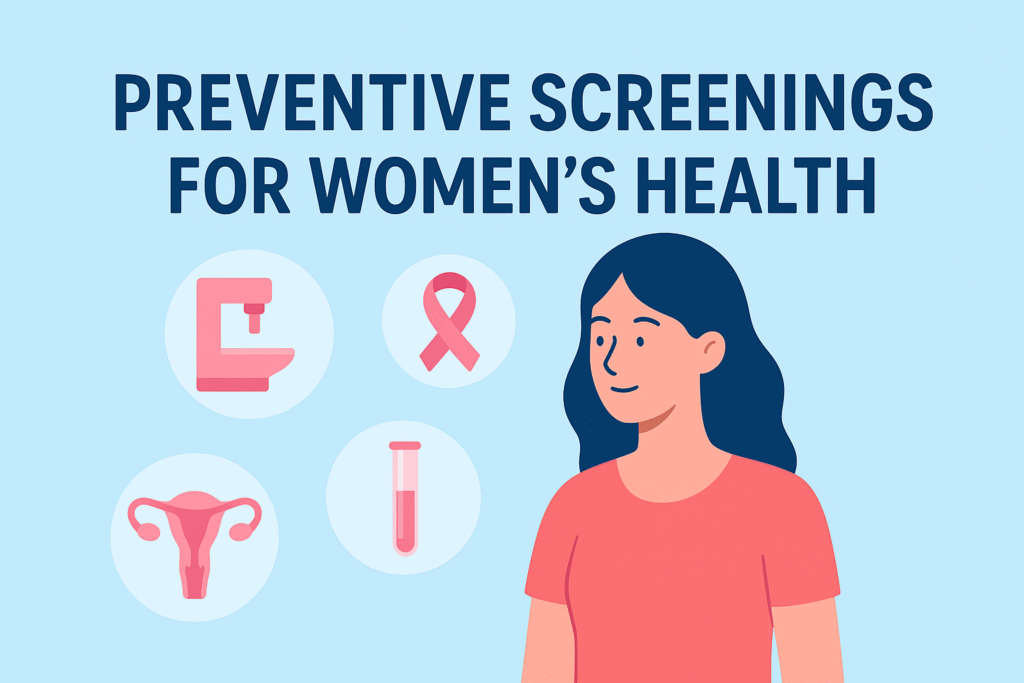
⚠️ Affiliate Disclaimer: This post may contain affiliate links, which means I may earn a small commission — at no extra cost to you — if you make a purchase through one of these links. I only recommend products or services I genuinely trust and believe can provide value. Thank you for supporting My Medical Muse!
Preventive Screenings for Women’s Health: 10 Essential Tests to Stay Healthy at Every Age
Preventive Screenings for Women’s Health: A Complete Guide to Staying Healthy
Women’s health is a lifelong journey that evolves through adolescence, adulthood, and into older age. Preventive screenings are a cornerstone of this journey, providing a proactive approach to maintaining wellness, identifying potential health issues early, and reducing the risk of serious diseases. Unlike routine checkups, these screenings are strategic tools that empower women to take charge of their health, make informed decisions, and implement timely interventions when necessary.
Regular screenings not only detect illnesses before symptoms appear but also offer valuable insights into risk factors, helping women adopt lifestyle changes that can prevent disease or slow its progression. From reproductive health and hormonal changes to heart disease and bone health, the range of preventive screenings addresses the unique challenges women face at different stages of life.
This comprehensive guide explores the essential preventive screenings every woman should consider, explains why each is important, and outlines recommended timelines to ensure optimal health throughout life. With this knowledge, women can confidently partner with their healthcare providers to stay informed, proactive, and empowered in their health journey.
Why Preventive Screenings Are Essential
Preventive health screenings are a critical component of proactive healthcare. By detecting diseases early often before any noticeable symptoms appear,these screenings can dramatically improve treatment outcomes, reduce the likelihood of complications, and, in many cases, save lives. For women, they are particularly important because they address health risks that are unique to female physiology, such as reproductive and hormonal changes, as well as conditions that are more common in women.
Regular preventive screenings provide more than just a snapshot of current health, they empower women to take informed actions that can prevent or mitigate serious illness. The benefits extend across multiple dimensions of well-being:
- Early Detection of Diseases: Routine screenings can identify conditions like breast cancer, cervical cancer, diabetes, and hypertension at an early stage, when treatment is most effective. Early intervention often leads to better outcomes and fewer complications.
- Risk Assessment: Screenings allow healthcare providers to evaluate individual risk factors, such as high cholesterol, obesity, family history of chronic illnesses, or lifestyle-related concerns. This information guides personalized recommendations for prevention and management.
- Health Education and Guidance: Preventive visits are an opportunity for women to receive expert advice on nutrition, exercise, stress management, and other lifestyle strategies that support long-term health.
- Peace of Mind: Knowing your health status can reduce anxiety and empower women to take a proactive approach to wellness. Regular screenings foster confidence, allowing women to focus on living fully without the constant worry of undiagnosed conditions.
In essence, preventive screenings are not just medical tests, they are a powerful tool for empowerment, offering women the knowledge and foresight needed to protect their health at every stage of life.
Core Preventive Screenings for Women
Preventive screenings are essential for maintaining long-term health and detecting conditions before they become serious. They are tailored to a woman’s age, medical history, family history, and lifestyle, helping to guide proactive care. Below is a detailed guide to the key screenings every woman should consider:
1. Breast Cancer Screening
Breast cancer remains one of the most common cancers in women, but early detection can significantly improve survival rates.
Screening Methods:
- Mammogram: A low-dose X-ray that detects tumors or abnormal growths. Recommended annually or every two years for women aged 40-74.
- Clinical Breast Exam (CBE): Physical examination by a healthcare provider. Recommended every 1-3 years for women 20-39, and annually for women 40+.
- Breast Self-Exam: Monthly self-checks help women notice any unusual lumps or changes early.
Risk Factors: Family history of breast cancer, age, obesity, alcohol consumption, and certain genetic mutations (e.g., BRCA1 or BRCA2).
2. Cervical Cancer Screening
Cervical cancer is largely preventable with regular screenings and HPV vaccination. Early detection identifies precancerous changes before they develop into cancer.
Screening Methods:
- Pap Smear Test: Detects abnormal or precancerous cells on the cervix. Women aged 21-29 should have a Pap test every 3 years.
- HPV Test: Detects high-risk human papillomavirus strains. Women aged 30-65 may have HPV testing every 5 years, or a combination of Pap and HPV testing every 5 years.
Additional Measures: HPV vaccination is recommended for adolescents and young adults up to age 26 to reduce the risk of cervical cancer.
3. Bone Health Screening
Osteoporosis weakens bones and increases the risk of fractures, especially after menopause. Early assessment helps prevent fractures and maintain mobility.
Screening Methods:
- Bone Mineral Density (BMD) Test / DEXA Scan: Measures bone density and predicts fracture risk. Recommended for women aged 65+, or earlier for women with risk factors.
Risk Factors: Family history, menopause, low calcium or vitamin D intake, sedentary lifestyle, smoking, and excessive alcohol consumption.
4. Cardiovascular Screening
Heart disease is the leading cause of death among women, often developing silently over years. Regular cardiovascular screenings help detect risk factors early.
Screening Methods:
- Blood Pressure Checks: At least once every 2 years, or more frequently if elevated.
- Cholesterol Testing: Every 4-6 years for women aged 20+, more frequently with risk factors.
- Blood Sugar Testing: Detects diabetes or prediabetes; recommended every 3 years from age 45, or earlier if risk factors exist.
- Electrocardiogram (ECG): May be recommended for women at higher cardiovascular risk.
Risk Factors: Obesity, sedentary lifestyle, smoking, high cholesterol, high blood pressure, and family history of cardiovascular disease.
5. Reproductive Health Screening
Reproductive screenings are critical for maintaining fertility, monitoring menstrual health, and identifying conditions like polycystic ovary syndrome (PCOS) or endometriosis.
Key Screenings:
- Pelvic Exam: Evaluates reproductive organs; recommended annually.
- STI Screening: Tests for infections such as chlamydia, gonorrhea, HIV, and syphilis, based on sexual activity and risk.
- Fertility Assessments: Women planning pregnancy may undergo hormone testing or ultrasounds to ensure reproductive health.
6. Thyroid Screening
Thyroid disorders, particularly hypothyroidism, are more common in women and can affect metabolism, energy levels, and reproductive health.
Screening Methods:
- TSH Blood Test: Recommended for women over 35 or those experiencing symptoms like fatigue, unexplained weight changes, or menstrual irregularities.
- Follow-Up Tests: T3 and T4 tests if TSH levels are abnormal.
7. Colorectal Cancer Screening
Though often associated with older adults, colorectal cancer can affect women at varying ages, particularly with a family history. Early detection improves treatment success.
Screening Methods:
- Colonoscopy: Recommended every 10 years starting at age 45.
- Stool-Based Tests: Fecal immunochemical test (FIT) or stool DNA testing every 1-3 years.
8. Vision and Hearing Screening
Maintaining sensory health is crucial for overall well-being, independence, and quality of life.
Screening Methods:
- Eye Exams: Every 2 years for women under 65, annually for women over 65, or sooner if vision changes occur.
- Hearing Tests: Recommended if hearing loss is suspected, if there is exposure to loud noise, or due to age-related changes.
9. Skin Cancer Screening
Skin cancer rates are rising, but early detection can be lifesaving.
Screening Methods:
- Full Skin Exam: Conducted by a dermatologist, especially for women with fair skin, numerous moles, or a family history of skin cancer.
- Self-Exams: Monthly checks for new or changing moles or lesions help detect early warning signs.
10. Mental Health Screening
Mental health is a vital component of overall wellness. Women are more susceptible to anxiety, depression, and postpartum mood disorders, making screening essential.
Screening Methods:
- Depression Screening: Tools like the PHQ-9 questionnaire, administered during routine visits.
- Anxiety Screening: Tools such as the GAD-7 for generalized anxiety disorder.
- Postpartum Screening: Women should be evaluated for postpartum depression within the first year after delivery, ensuring timely support and treatment.
Why It Matters: Regular mental health screening promotes emotional well-being, improves quality of life, and allows early intervention for conditions that could otherwise go unnoticed.
Age-Specific Preventive Screening Guidelines
Preventive needs evolve across a woman’s lifetime. Here’s a general guide:
Age Group | Recommended Screenings | Notes |
20-29 | Pap smear (every 3 years), STI testing, clinical breast exam | Focus on reproductive and sexual health |
30-39 | Pap smear/HPV co-test, clinical breast exam, cholesterol, blood pressure | Begin discussing family planning and bone health |
40-49 | Mammogram (annual/biennial), Pap/HPV, cholesterol, blood sugar, blood pressure, colon cancer (if risk factors) | Monitor perimenopause changes |
50-64 | Mammogram, Pap/HPV (if needed), bone density, colon cancer screening, cholesterol, blood pressure, diabetes | Menopause-related health becomes critical |
65+ | Mammogram (if life expectancy >10 yrs), colonoscopy, bone density, vision, hearing, cardiovascular screenings | Focus on functional independence and quality of life |
Understanding Your Risk Factors
Not all women face the same health risks, which is why personalized screening schedules are important. Several factors influence risk levels:
- Family History & Genetics: A family history of breast, ovarian, or colorectal cancer increases your likelihood of developing these conditions. Genetic mutations such as BRCA1 or BRCA2 may require earlier or more frequent screenings.
- Personal Medical History: Past health conditions like high blood pressure, diabetes, or autoimmune disorders can increase vulnerability to other diseases.
- Lifestyle Factors: Sedentary habits, smoking, excessive alcohol use, and poor diet can elevate risks for cardiovascular disease, diabetes, and certain cancers.
- Reproductive and Hormonal Factors: Early menopause, irregular menstrual cycles, or hormonal imbalances can affect bone, heart, and reproductive health.
By understanding your personal risk profile, you and your healthcare provider can develop a targeted screening plan to detect issues early and maximize prevention.
How to Prepare for Screenings
Proper preparation ensures accurate results and a smooth experience. Here’s how to get ready for common screenings:
- Schedule Strategically: Book appointments at times that work best for you, and consider early morning fasting for blood tests if required.
- Bring Your Medical History: Include family history, previous test results, medications, and any chronic conditions.
- Track Symptoms or Cycles: For reproductive exams, noting menstrual patterns or changes can provide valuable information.
- Wear Comfortable Clothing: Especially for mammograms, pelvic exams, or physical assessments.
- Ask Questions in Advance: Understanding what to expect can reduce anxiety and help you feel more confident.
Being proactive about preparation helps ensure screenings are effective, comfortable, and stress-free.
What to Do After Your Screening
Receiving results is only the first step; taking action afterward is crucial:
- Review Results Carefully: Ask your healthcare provider to explain findings in detail and what they mean for your health.
- Follow-Up Appointments: Schedule any recommended follow-ups or additional tests promptly.
- Adjust Lifestyle Habits: Implement changes suggested by your provider diet, exercise, sleep, and stress management all contribute to better outcomes.
- Create a Health Plan: Maintain a calendar of future screenings, track your progress, and note any changes in your health to share with your provider.
- Seek Support if Needed: Emotional or mental support, counseling, or patient groups can help if screenings reveal significant findings.
Taking these steps ensures screenings have a lasting impact, helping you stay proactive about your long-term health.
Lifestyle Choices That Complement Preventive Screenings
While preventive screenings are vital for early detection and risk management, adopting healthy lifestyle habits significantly enhances their effectiveness. Small, consistent choices can strengthen your body, improve resilience, and reduce the likelihood of chronic diseases. Key lifestyle strategies include:
- Balanced Diet: Focus on nutrient-dense foods such as fruits, vegetables, whole grains, lean proteins, and healthy fats. Proper nutrition supports immune function, maintains healthy weight, and reduces risks for heart disease, diabetes, and certain cancers.
- Regular Exercise: Engage in at least 150 minutes of moderate-intensity aerobic activity per week, combined with strength training. Exercise improves cardiovascular health, strengthens bones, regulates hormones, and supports mental well-being.
- Adequate Sleep: Aim for 7-9 hours of restorative sleep each night. Sufficient sleep regulates metabolism, supports cognitive function, and reduces stress-related health risks.
- Stress Management: Chronic stress can contribute to hypertension, heart disease, and mental health disorders. Practices such as meditation, yoga, deep breathing exercises, or therapy can help manage stress effectively.
- Avoid Harmful Habits: Limit alcohol consumption, refrain from smoking, and reduce exposure to environmental toxins. These behaviors lower the risk of cancer, respiratory disease, and cardiovascular complications.
In combination with regular screenings, these lifestyle choices create a strong foundation for long-term health and wellness.
Barriers to Preventive Screenings
Despite their clear benefits, many women do not undergo recommended preventive screenings. Understanding and addressing these barriers is essential to improving health outcomes:
- Cost or Lack of Insurance: The perceived expense of preventive care can deter women from scheduling screenings, particularly without adequate insurance coverage.
- Fear or Anxiety: Worries about discomfort, test results, or invasive procedures often prevent timely screening.
- Lack of Awareness: Many women are unsure which screenings they need or how frequently they should be performed.
- Limited Access: Geographic, transportation, or logistical challenges can restrict access to healthcare facilities, especially in rural areas.
Overcoming Barriers: Solutions such as telehealth consultations, community health programs, mobile screening units, and broader insurance coverage can make preventive care more accessible. Education campaigns and personalized healthcare guidance also empower women to prioritize screenings without fear or confusion.
By combining healthy lifestyle practices with regular screenings and addressing access challenges, women can take full control of their health, detecting issues early and reducing risks for serious disease.
Conclusion
Preventive screenings are more than routine medical tests they are a powerful tool for safeguarding women’s health throughout life. By identifying diseases early, assessing risk factors, and enabling timely interventions, these screenings can significantly improve outcomes and reduce the likelihood of serious complications.
Understanding which screenings are appropriate at each stage of life allows women to take a proactive, informed approach to their health. When combined with healthy lifestyle choices such as a balanced diet, regular exercise, stress management, and avoidance of harmful habits preventive care becomes even more effective, helping women maintain vitality, independence, and overall well-being.
Ultimately, your health is your most valuable asset. Prioritizing regular screenings and embracing a proactive, holistic approach empowers women to live fully, confidently, and with greater peace of mind. By staying informed and engaged in your healthcare, you can enjoy a longer, healthier life and make each stage of life as vibrant and fulfilling as possible.
👩⚕️ Need Personalized Health Advice?
Get expert guidance tailored to your unique health concerns through MuseCare Consult. Our licensed doctors are here to help you understand your symptoms, medications, and lab results—confidentially and affordably.
👉 Book a MuseCare Consult NowRelated Blog Post You MIght Like:
- Cold Feet and Tingling? 7 Easy At-Home Tests for Nerve Damage
- 17 Sneaky Clues on How to Tell If You Have Iron Deficiency Without a Blood Test
- 10 Proven Tips on How to Interpret Hemoglobin A1c Levels Accurately
- What to Expect During Colonoscopy Prep: A Step-by-Step Guide to Getting It Right
- 5 Sneaky Vitamin Deficiencies That Cause Digestive Issues
Dr. Ijasusi Bamidele, MBBS (Binzhou Medical University, China), is a medical doctor with 5 years of clinical experience and founder of MyMedicalMuse.com, a subsidiary of Delimann Limited. As a health content writer for audiences in the USA, Canada, and Europe, Dr. Ijasusi helps readers understand complex health conditions, recognize why they have certain symptoms, and apply practical lifestyle modifications to improve well-being


